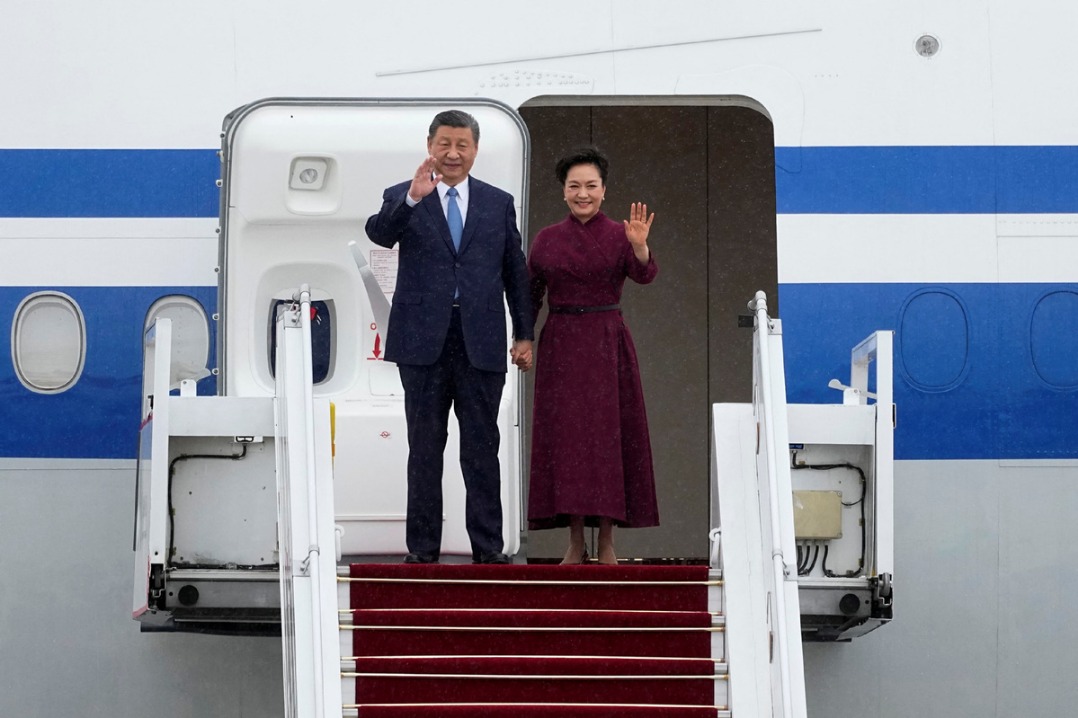Up and coming
By CAO SHENGXI | China Daily Global | Updated: 2020-04-15 08:00

Reforms and opening-up are fueling Shanghai's rising financial status
Recently, the latest edition of the Global Financial Centers Index (GFCI 27) was released, in which Shanghai ranked fourth, behind New York and London by 2 points and Tokyo by 1 point, ahead of Singapore and Hong Kong. This is magnificent progress from ranking 35th in 2009, when the State Council, China's Cabinet, announced its blueprint to build Shanghai into an international financial center.
What has driven this transformation?
Huge efforts have been devoted to the modernization and internationalization of China's financial system since 2009, especially after the 18th Communist Party of China Central Committee decided to let the market play the decisive role in the allocation of resources. China's opening-up and reforms have always adhered to an experimentation and phased implementation approach, and reforms in its financial regime have been no exception to this, happening one after another. In 2012, the People's Bank of China, China's central bank, loosened the limits on renminbi deposit rates and then abandoned them in 2015. The controlled renminbi exchange rate was also liberalized to be a floating exchange rate regime with macro prudential management. As to the capital markets, the size and range of the qualified foreign institutional investor (QFII) and renminbi qualified foreign institutional investor (RQFII) programs were gradually enlarged and finally liberalized in 2019; moreover, the mainland's equity and bond markets were connected with those in Hong Kong and then London, becoming primarily international. When it comes to more sensitive and foundational areas such as loan rate guidance and financial services sector opening-up, China has used both the loan prime rate decided by the markets and the baseline loan rate decided by the PBOC together for almost five years and finally got rid of the government-dominant rate in 2019, liberalizing the banking sector in a giant leap. It was a similar story for opening-up its financial service sector to foreign companies. Shanghai, as the planned global financial center with strong financial resource allocation capacity, is the frontier for all these reforms.
What makes a financial center in this digital era also makes it much more difficult for a city to obtain the status as a global financial center than to maintain it. Besides the power of endowed capacities and economies of scale, a modern financial center exists on the emergence of trust relationships and the institutionalization of transactional norms within the city, which requires some fortuitous events to start the trajectory.
What has been the critical fuel for Shanghai's rise as a global financial center? Given the existence of Hong Kong, Singapore and Tokyo in Asia, the suggestion that it is because it enjoys a favorable time zone does not hold water. Information asymmetry is, nevertheless, an important factor. From a historical perspective, being a great economic power does not necessarily mean having a global financial center although it does mean the establishment of a regional one is achieved almost naturally. Considering the huge amounts of data generated on a daily basis, a regional financial center serves as the most efficient way to gather and use the information collected. China's financial markets are quite large. By the end of 2018, its bond market had expanded to 12.6 percent of the world's total, up from 1.2 percent in 2004 and it had a similar share of the global equity-market capitalization. More important, such a huge financial market is not deep enough for the Chinese real economy while the eagerness of foreign financial institutions to enter the Chinese market has not been satisfied. In other words, China is still under a restricted financial environment, which means its financial sector will grow faster than its total GDP in the coming years with more financial opening-up and reforms. Internationally, there will be a growing capital allocation to Chinese assets.
This makes Shanghai in the 2020s different from Tokyo in the 1980s. Information asymmetry helped to build some Japanese financial institutions into among the largest in the world as they served to channel the huge pool of Japanese private savings into foreign markets, but the allocation business was mostly done through New York or London instead of Tokyo. Neither Japanese individuals nor the Japanese government sought to bring global business into Tokyo. China, however, is opening up its financial services sector and trying to attract global financial institutions to conduct business on the mainland. To this end, Shanghai has built up lots of support facilities, such as the pilot Shanghai Finance Court, in order to improve the efficiency of financial transactions. Meanwhile, on Feb 25, the PBOC, together with the China Banking and Insurance Regulatory Commission, the China Securities Regulatory Commission, the State Administration of Foreign Exchange and Shanghai municipal government, issued guidance on furthering loosening the financial regulations in Shanghai, encouraging foreign financial institutions to operate in Shanghai.
Another factor that may advance Shanghai's emergence as a truly global financial center is the recent hyper uncertainty. Noticeably, the top eight cities in GFCI 27 have all lost some points compared with their previous scores. As London and Hong Kong have lost many points, Shanghai's position has improved. For London, Brexit finally became true and motivated financial institutions to move to the European continent, while Hong Kong's status has been hit by its social instability and political tensions. In contrast, the Chinese mainland has always been contributing certainty to globalization, economic integration and shared prosperity in this era of hyper uncertainty. When we look the way forward, especially with the uncertainties created by the novel coronavirus, the certainty and sense of stability China offers is a bonus. Accordingly, Shanghai, after becoming the dominant international financial center in renminbi-related business, has a bright future as it becomes a global financial center.
The author is a research fellow at the China Finance 40 Forum. The author contributed this article to China Watch, a think tank powered by China Daily. The views do not necessarily reflect those of China Daily.
























